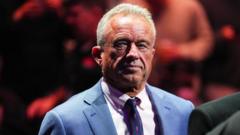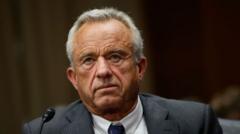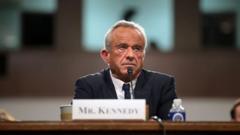Robert F. Kennedy Jr. is striving to reshape America's food environment, targeting ultra-processed foods and advocating for stricter regulations on additives and food dyes. As President-elect Donald Trump’s nominee for Secretary of Health and Human Services, Kennedy’s controversial history may overshadow his ambitions. He argues that current dietary practices endanger children’s health, but achieving significant reform amidst industry pushback and political resistance will be a formidable task.
**The Challenge of a Health Overhaul: Can RFK Jr. Reform America's Food Industry?**

**The Challenge of a Health Overhaul: Can RFK Jr. Reform America's Food Industry?**
RFK Jr.'s ambitious plans for healthier eating face hurdles in the complex U.S. food landscape.
Robert F. Kennedy Jr., known for his outspoken views on health matters, is focusing his sights on reforming America's diet, specifically by addressing the prevalence of ultra-processed foods, additives, and artificial dyes. The President-elect Trump's nominee for Secretary of Health and Human Services spoke at a rally about the changes he envisions for the nation’s food landscape, claiming that the food industry is betraying children by exposing them to harmful ingredients.
Kennedy's strategy includes phasing out products loaded with unhealthy components, which he links to a rise in chronic diseases. Though he has garnered some support from public health advocates and even certain Democrats, skepticism remains about his ability to tackle the might of Big Food and push through regulatory changes.
In previous discussions leading to his nomination, he emphasized the urgent need to reform school lunch programs, warning of a generation of children "swimming around in a toxic soup." His campaign to revamp the U.S. Food and Drug Administration (FDA) includes plans to eliminate additives like Red No. 3 and remove certain oils from American diets based on concerns they contribute to health issues.
However, Kennedy's confirmation will not be without its challenges. Many experts are questioning the feasibility of his ambitious goals, especially regarding the complexities of the U.S. food regulatory framework which involves both the FDA and the U.S. Department of Agriculture. Critics underscore that food reform is more intricate than it appears and may not align with current political norms nor with Trump's historical affinity for the fast food industry.
While Kennedy's call for a healthier America resonates with many, the political and bureaucratic obstacles he faces could undermine his objectives. Thus, while Kennedy’s rhetoric has captured attention, the path to reform may likely be paved with significant challenges as he confronts industry lobbying and the intricacies of health regulations in the United States.




















